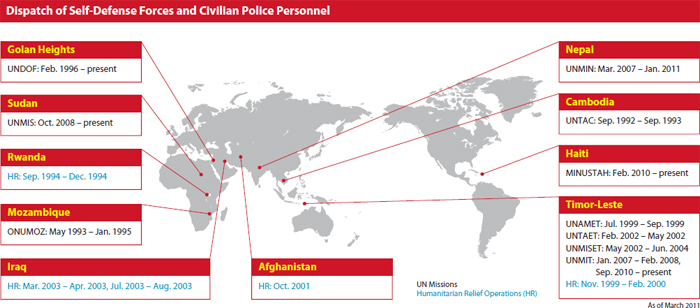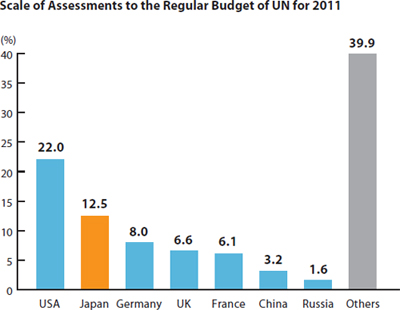Japan's contribution to International Peace and Security
October 2011
Peacekeeping / Peacebuilding
Japan has designated peacebuilding as one of its major diplomatic priorities, in order to build the foundations for sustainable peace and prevent the recurrence of conflicts.
Peacebuilding Commission (PBC)
In recognition of the significant role of the PBC in advising on proposed integrated strategies for post-conflict peacebuilding and recovery, Japan has been actively contributing to the work of the PBC. Japan has chaired the commission in 2007-2008, and in 2011, Japan serves as Chair of the Working Group on Lessons Learned.


Official Development Assistance (ODA)
Japan has incorporated peacebuilding as one of the four priority issues in its basic policy on ODA, and has contributed in diverse areas such as humanitarian assistance, assistance for domestic stability and security and assistance for reconstruction.
Security Council Working Group on PKOs
As Chair of the Security Council Working Group on Peacekeeping Operations (PKOs), Japan made efforts to promote the comprehensive review of PKOs by inviting the participation of many stakeholders non-members of the Council, especially those countries contributing troops and police personnel.
Program for Human Resource Development in Asia for Peacebuilding
Japan launched the program in 2007 in order to strengthen civilian capacity of Japan and other Asian Countries in the field of peacebuilding. About 110 Japanese and Asian trainees finished the program and many of them are working in the field such as Sudan and Timor-Leste.
Column: Human Security
In order to counter the diverse and complex threats in the globalized world, Japan upholds the concept of human security as one of the major pillars of its foreign policy. In this regard, Japan has been assisting communities in post-conflict situations, empowering refugees and contributing to conflict prevention through the UN Trust Fund for Human Security, which was established under the initiative of Japan in 1999. Japan’s effort resulted in the publication of the Report of the UN Secretary-General and a General Assembly resolution on human security (A/RES/64/291) adopted by consensus.
Disarmament / Non-Proliferation
As the only country to have experienced the devastation of nuclear weapons and a responsible non-nuclear-weapon State, Japan has the moral responsibility to take concrete steps to realize a world without nuclear weapons.
Commitment to Nuclear Disarmament and Non-Proliferation
In September 2009, the then Prime Minister Yukio Hatoyama attended the UN Security Council Summit on Nuclear Non-Proliferation and Nuclear Disarmament. Japan is striving to lead international efforts for nuclear disarmament, non-proliferation of nuclear weapons, the peaceful use of nuclear energy and nuclear security (i.e. prevention of nuclear terrorism).
Working towards Total Elimination of Nuclear Weapons
Japan has been putting forward a resolution on nuclear disarmament to the UN General Assembly, every year since 1994, focusing on taking concrete step towards the total elimination of nuclear weapons.
Proactively Engaging in Arms Control and Disarmament
Japan plays an active role in the field of conventional arms control and disarmament. Almost every year since 1995 Japan has submitted UN draft resolutions on the illicit trade in small arms and light weapons (SALW) in all its aspects. The draft SALW resolution submitted in 2010 was adopted by consensus.
Japan also provides assistance to projects alleviating humanitarian consequences caused by conventional weapons including SALW, landmines, and cluster munitions.
Contribution to the Financing of the UN
Japan is the second-largest contributor to the UN budgets among the Member States, bearing 12.5% of the total budget. In addition, Japan supports a wide range of UN activities through voluntary financial contributions, which have been highly valued by the international community.

Back to Index
